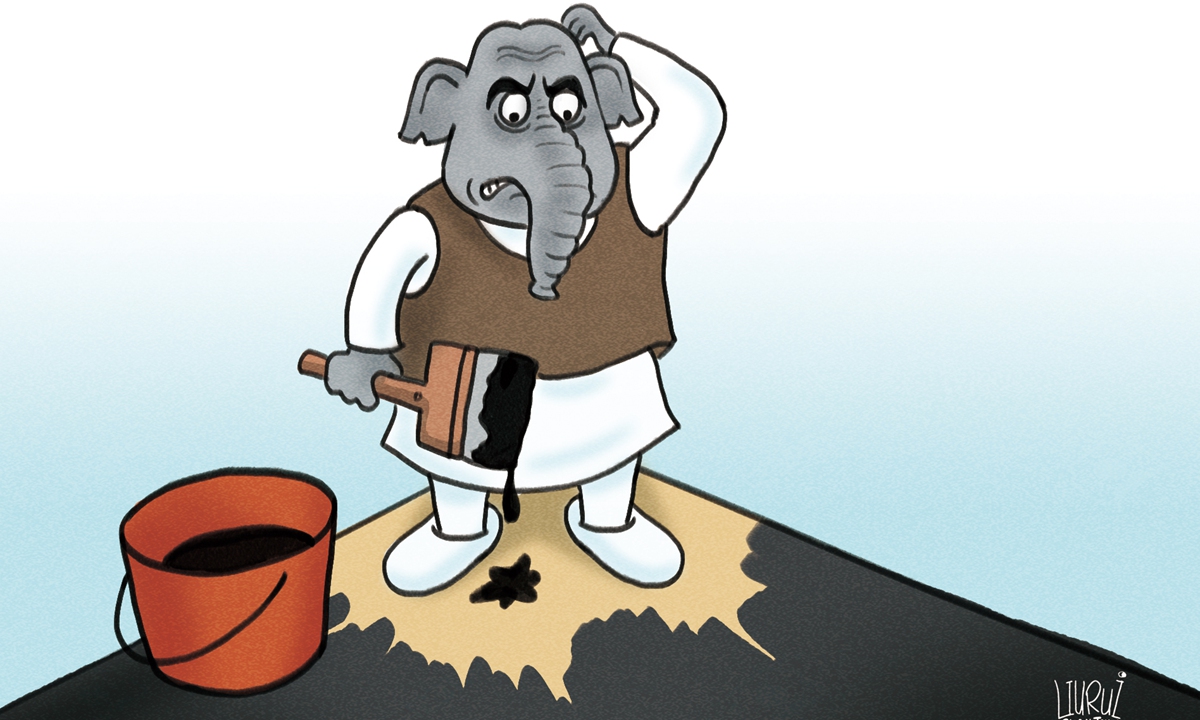
Illustration: Liu Rui/GT
On February 4 at the AeroIndia exhibition, India hosted the first ever Indian Ocean Region (IOR) defense ministers conference, themed “Enhanced Peace, Security and Cooperation in the Indian Ocean”
The Diplomat suggests that “the immediate imperative for India to convene a defense ministers meeting is possibly China’s growing activities in the Indian exclusive economic zone (EEZ).”
New Delhi is reluctant to see China’s increasing presence in the IOR in general. It harbors paranoid ideas that China's growing military power will threaten its dominant role in the region.
Of course, it is nonsensical that China's normal actions are seen by India as a threat to the security of IOR. These common-sense activities include sending warships to the Gulf of Aden for anti-piracy efforts and deploying research vessels to the Indian Ocean.
New Delhi should be reminded that China, as a permanent member of the UN Security Council, has the responsibility to maintain world peace and security. How could China have conducted escort missions in the Gulf of Aden if it had not been authorized and affirmed by the UN?
Truth be told, India’s sense of crisis comes from an instinctive reaction to the setback of its ambition to dominate the Indian Ocean. In an era when it is becoming more and more untenable and costly to try to maintain exclusive control over the Indian Ocean, New Delhi needs to find external threats as an excuse to achieve its strategic goals to dominate the region.
Since independence in 1947, India has always considered itself as the “steward” of the Indian Ocean. However, the Indian Ocean is a large area and India is not a great power yet. After being impacted by COVID-19, India's comprehensive national power has suffered a serious setback. Its global status has also declined. India now needs to return to the path of multilateralism to share the cost of maintaining its hegemony in the region.
According to the Times of India newspaper, New Delhi is hoping to shore up its own security and defense engagement with Madagascar and Comoros in order to counter Beijing’s perceived influence in the western Indian Ocean.
However, countries in this region may not be interested in New Delhi’s endeavors to pull them over to India’s side. Countries such as Madagascar are sovereign nations. They have the right to formulate their foreign policies by themselves, and carry out their international affairs by themselves. They will not blindly tie themselves to India. Moreover, these countries have always maintained friendly relations with China. Why? Because China actively supports them to play their proper roles in the Indian Ocean region. It applauds their independence in internal affairs, and strategic autonomy.
In the context of the recent border conflict between China and India, there are concerns that the rivalry between the two countries might extend from their border issue into the Indian Ocean. China has never treated India as a threat or a rival. Quite the opposite. China has always viewed India as its partner in terms of development and pragmatic cooperation in various fields. Therefore, any speculation that China is engaging in a geo-strategic competition with India is untrue.
In recent years, India has been considering China as a hypothetical enemy on several issues. This is the inevitable result of the cold war mentality that has dominated the Indian strategic community for the past few years. From China's point of view, there is no need for anyone to react to false assumptions that might be floated by media or politicians in India.
China does not oppose this Indian-led defense ministers’ meeting. The meeting is not pointless. It will hopefully be conducive to maintaining openness, security, stability, and prosperity in the Indian Ocean region – and not seek to gang up on China.
However, it aims to formulate new ways to suppress China and tries to get other IOR countries involved to join India’s anti-China plans. The meeting will not produce any practical results in this regard. It will only make India look like it is overestimating its power.
The article was compiled by Global Times reporter Xia Wenxin based on an interview with Lan Jianxue, deputy director of the Department for Asia-Pacific Studies at China Institute of International Studies. opinion@globaltimes.com.cn
